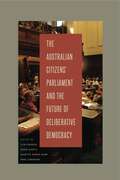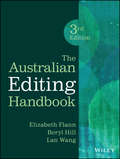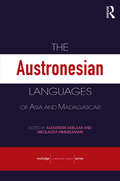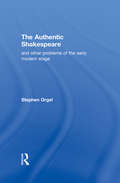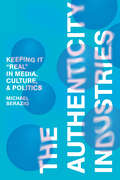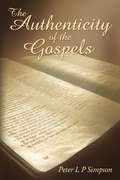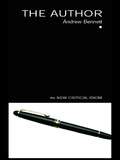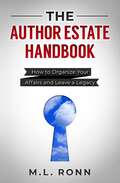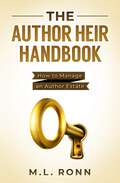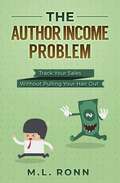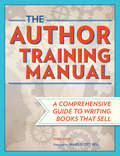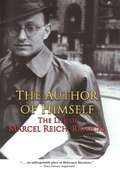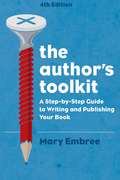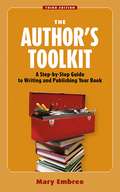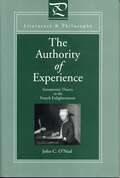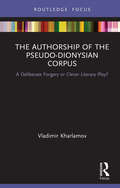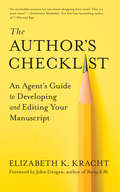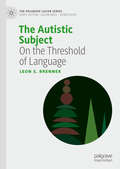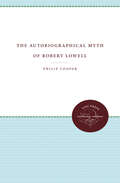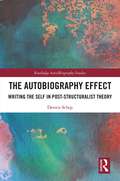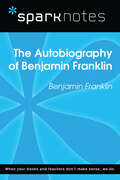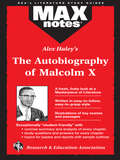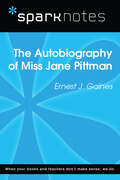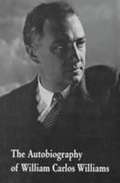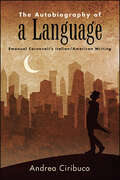- Table View
- List View
The Australian Citizens’ Parliament and the Future of Deliberative Democracy: Australian Citizens' Parliament And The Future Of Deliberative Democracy (Rhetoric and Democratic Deliberation #8)
by Lyn Carson John Gastil Janette Hartz-Karp Ron LubenskyGrowing numbers of scholars, practitioners, politicians, and citizens recognize the value of deliberative civic engagement processes that enable citizens and governments to come together in public spaces and engage in constructive dialogue, informed discussion, and decisive deliberation. This book seeks to fill a gap in empirical studies in deliberative democracy by studying the assembly of the Australian Citizens’ Parliament (ACP), which took place in Canberra on February 6–8, 2009. The ACP addressed the question “How can the Australian political system be strengthened to serve us better?” The ACP’s Canberra assembly is the first large-scale, face-to-face deliberative project to be completely audio-recorded and transcribed, enabling an unprecedented level of qualitative and quantitative assessment of participants’ actual spoken discourse. Each chapter reports on different research questions for different purposes to benefit different audiences. Combined, they exhibit how diverse modes of research focused on a single event can enhance both theoretical and practical knowledge about deliberative democracy.
The Australian Editing Handbook
by Lan Wang Beryl Hill Elizabeth FlannThe ultimate editing handbook, updated for the digital ageThe Australian Editing Handbook has become an industry standard, recommended by the Society of Editors, and holds a prominent place on the shelves of writers, editors and students alike. Authors Elizabeth Flann, Beryl Hill and Lan Wang have assembled a comprehensive guide to every aspect of the editing process, from working with authors and receiving manuscripts, to editorial, production, printing and beyond. The modern editor must go beyond editing and proofreading, and is often tasked with obtaining permissions, sourcing supplementary material and keeping the author on schedule and on budget. That means the editor is also the ultimate mediator of style and propriety for the piece, acting as gatekeeper between the author and the public. It's a substantial role, requiring the fundamental knowledge of several different fields to achieve effective results. A guide to managing each aspect of the job, The Australian Editing Handbook is an invaluable resource. The Third Edition includes updated information about the new challenges that editors face in the digital age, including:Editing on-screenDigital publishingHandling ebooksPrint media versus online publicationsThe book includes two-color printing to make editing marks easier to understand, and a wealth of charts and diagrams that simplify complex topics and serve as handy quick-checks that make this guide the ultimate desk reference. For professionals and students in the field of editing, writing, publishing or journalism, The Australian Editing Handbook, 3rd Edition is the industry's number-one resource.
The Austronesian Languages of Asia and Madagascar (Routledge Language Family Ser. #Vol. 7)
by Alexander Adelaar Nikolaus P. HimmelmannSome 800 Austronesian languages are spoken in the area extending from Madagascar to eastern Indonesia and to the north to Taiwan and the Philippines. They vary greatly in almost every possible respect, including the size and social make-up of the speech communities and their typological profiles. This book is designed to serve as a reference work a
The Authentic Shakespeare: and Other Problems of the Early Modern Stage
by Stephen OrgelFirst published in 2003. Routledge is an imprint of Taylor & Francis, an informa company.
The Authenticity Industries: Keeping it "Real" in Media, Culture, and Politics
by Michael SerazioIn recent decades, authenticity has become an American obsession. It animates thirty years' worth of reality TV programming and fuels the explosive virality of one hot social media app after another. It characterizes Donald Trump's willful disregard for political correctness (and proofreading) and inspires multinational corporations to stake activist claims in ways that few "woke" brands ever dared before. It buttresses a multibillion-dollar influencer industry of everyday folks shilling their friends with #spon-con and burnishes the street cred of rock stars and rappers alike. But, ironically, authenticity's not actually real: it's as fabricated as it is ubiquitous. In The Authenticity Industries, journalist and scholar Michael Serazio combines eye-opening reporting and lively prose to take readers behind the scenes with those who make "reality"—and the ways it tries to influence us. Drawing upon dozens of rare interviews with campaign consultants, advertising executives, tech company leadership, and entertainment industry gatekeepers, the book slyly investigates the professionals and practices that make people, products, and platforms seem "authentic" in today's media, culture, and politics. The result is a spotlight on the power of authenticity in today's media-saturated world and the strategies to satisfy this widespread yearning. In theory, authenticity might represent the central moral framework of our time: allaying anxieties about self and society, culture and commerce, and technology and humanity. It infects and informs our ideals of celebrity, aesthetics, privacy, nostalgia, and populism. And Serazio reveals how these pretenses are crafted, backstage, for audiences, consumers, and voters.
The Authenticity of the Gospels
by Peter L SimpsonThat the Gospels are the writings of their traditional Apostolic authors was long held to be settled truth. It was also long held that Matthew was first and as early as the 40sAD, followed by Mark and Luke, and lastly by John, and that all were written before about 70AD. These views have been doubted or denied by New Testament scholars from about the end of the 18thCentury. The dominant view is that the Gospels were not written by eyewitnesses, though they depend on material that may go back to eyewitnesses. Mark is said to have been written first and not much before 70AD. Matthew and Luke are later and depend on Mark and some unknown sources. John is last, follows an independent tradition, and could be as late as 100AD.The reason for this change of views is the so-called historical critical method, which claims to be scientific and up to date in literary criticism and the detection of different temporal layers in written texts. The method also assumes that reports of miracles and other supernatural phenomena are not historical but later inventions added for religious purposes.This book shows that the historical critical method is not historical or critical or even a method. For the method assumes but cannot prove that supernatural happenings are unhistorical; it ignores the historical evidence about the origin and authorship of the Gospels; its literary criticism is unimaginative and its application of it to questions of dating arbitrary. There is no reason to accept its results as well founded or even believable. The traditional dating and authorship of the Gospels is the only account that makes sense.Nevertheless, elements of the historical critical method have a legitimate use if they are applied fairly and taken along with the historical evidence and the fact (well established by eyewitnesses) of supernatural realities. When these elements are so used they can be shown to give plausible and defensible accounts of the origin, in particular, of the Gospels of Mark and Luke, which, along with Matthew, show signs of dependence and overlap. If the historical evidence is taken seriously, and if literary criticism is applied fairly, a plausible account can be given of the origin in particular of the Gospel of Mark, of how it arose from the preaching of Peter relative to the older Gospel of Matthew and to the newer Gospel of Luke sponsored by the Apostle Paul.This alternative account of the origins of Mark and Luke is a fine example of how historical evidence and literary criticism can be used to explain otherwise puzzling phenomena. This account is perhaps not the only one to save all the phenomena. But it shows how the traditional authorship and dating of the Gospels, contrary to the historical critical method, make excellent sense of all the phenomena: literary, historical, and rational. The traditional view about the Gospels is the only sensible view to adopt.
The Author (The New Critical Idiom)
by Andrew BennettThis volume investigates the changing definitions of the author, what it has meant historically to be an 'author', and the impact that this has had on literary culture. Andrew Bennett presents a clearly-structured discussion of the various theoretical debates surrounding authorship, exploring such concepts as authority, ownership, originality, and the 'death' of the author. Accessible, yet stimulating, this study offers the ideal introduction to a core notion in critical theory.
The Author Estate Handbook: How to Organize Your Affairs and Leave a Legacy (Author Level Up #17)
by M.L. RonnThe definitive guide to estate planning for authors—now available in audiobook and large print! If you died tomorrow, would your books survive you? It's so easy to focus on writing and marketing. You’re so busy building a writing business, but you know that if you don’t plan on what will happen after your death, everything you’re building won’t matter. Yet, you probably don’t know where to start. This book will help you get your affairs in order, understand estate planning basics, and make a plan so that you can create a legacy that will continue making money for your family long after you're gone. Get organized once and for all--quickly and painlessly Avoid the top 10 estate-ending mistakes Learn how to gather all your affairs in one place Discover key talking points to bring up with your estate planning attorney that no one else will tell you about From passwords to bank accounts to book retailer accounts, this book will hold your hand through the process of getting your ducks in a row. This book will help you get more organized and help your heirs make more money from your books. It'll give you a fighting chance at preserving the amazing legacy you're already building. V2.0
The Author Heir Handbook: How to Manage an Author Estate (Author Level Up #18)
by M.L. RonnAn author has died. You're responsible for managing their estate, and it's a mess. Are you overwhelmed? Frustrated? You might be feeling that this responsibility the author gave you is more of a burden than a gift. You know that managing the author's books will make money and provide for you and the author's heirs, but you probably have no idea where to start. The Author Heir Handbook is a concise guide for heirs written in PLAIN ENGLISH that will help you understand an author's publishing business, the different components that the deceased author used to create books and income, and how to manage those components. It will save you countless hours by helping you figure out where to spend your time and effort.This book will help you: Avoid making mistakes that could cripple the estate Locate the author's manuscripts Take an inventory of all the author's works (with an easy template to save time) Determine which online accounts the author used (and how to access them) * Manage the money Get hired help when you need it (and how to avoid scams) Keep the author's books relevant for new generations Create income for you and your family, the way the author intended Managing an author estate is hard work, but this book will help simplify the process. You just might even be able to do more with the estate than the author ever could in their lifetime. Purchase your copy today, and don’t do things the hard way! V1.0
The Author Income Problem: Track Your Sales Without Pulling Your Hair Out (Author Level Up #6)
by M.L. RonnDo you struggle with tracking your author income? It ain’t easy. If you publish your books wide, you might get AT LEAST a dozen sales reports every month. It makes most authors want to pull their hair out!In this guide, prolific author M.L. Ronn walks through the process he used to tame his sales reports. He transformed a 5-hour per month process into a 30-minute effort using the power of technology and automation. This book is a blueprint to how he did it. This book is also a blueprint for entrepreneurs and developers who want to solve this problem. It will show you why the author income problem is so complex and exactly how to solve it. Tracking your income doesn’t have to be hard. All it takes is the right approach. Ready to solve the author income problem once and for all? V1.0
The Author Training Manual: A Comprehensive Guide to Writing Books That Sell
by James Scott Bell Nina AmirIf you want to write a book that's going to sell to both publishers and readers, you need to know how to produce a marketable work and help it become successful. It starts the moment you have an idea. That's when you begin thinking about the first elements of the business plan that will make your project the best it can be. The reality is that you don't want to spend time and energy writing a book that will never get read. The way to avoid that is to create a business plan for your book, and evaluate it (and yourself) through the same lens that an agent or acquisitions editor would. The Author Training Manual will show you how to get more creative and start looking at your work with those high standards in mind. Whether you're writing fiction or non-fiction, or intend to publish traditionally or self-publish, author Nina Amir will teach you how to conduct an effective competitive analysis for your work and do a better job at delivering the goods to readers than similar books that are already on the shelf. Packed with step-by-step instructions, idea evaluations, sample business plans, editor and agent commentaries, and much more, The Author Training Manual provides the information you need to transform from aspiring writer to career author.
The Author of Himself: The Life of Marcel Reich-Ranicki
by Marcel Reich-RanickiMarcel Reich-Ranicki is remarkable for both his unlikely life story and his brilliant career as the "pope of German letters." His sublimely written autobiography is at once a fascinating adventure tale, an unusual account of German-Jewish relations, a personal rumination on who's who in German culture, and a love letter to literature. Reich-Ranicki's life took him from middle-class childhood to wartime misery to the heights of intellectual celebrity. Born into a Jewish family in Poland in 1920, he moved to Berlin as a boy. There he discovered his passion for literature and began a complex affair with German culture. In 1938, his family was deported back to Poland, where German occupation forced him into the Warsaw Ghetto. As a member of the Jewish resistance, a translator for the Jewish Council, and a man who personally experienced the ghetto's inhumane conditions, Reich-Ranicki gained both a bird's-eye and ground-level view of Nazi barbarism. Written with subtlety and intelligence, his account of this episode is among the most compelling and dramatic ever recorded. <P><P>He escaped with his wife and spent two years hiding in the cellar of Polish peasants—an incident later immortalized by Günter Grass. After liberation, he joined and then fell out with the Communist Party and was temporarily imprisoned. He began writing and soon became Poland's foremost critical commentator on German literature. When Reich-Ranicki returned to Germany in 1958, his rise was meteoric. In short order, he claimed national celebrity and notoriety as the head of the literary section of the leading newspaper and host of his own television program. He frequently flabbergasted viewers with his bold pronouncements and flexed his power to make or break a writer's career. His list of friends and enemies rapidly expanded to include every influential player on the German literary scene, including Grass and Heinrich Böll. This, together with his keen critical instincts, makes his memoir an indispensable guide to contemporary German culture as well as an absorbing eyewitness history of some of the twentieth century's most important events.
The Author's Toolkit: A Step-by-Step Guide to Writing and Publishing Your Book
by Mary EmbreeAll writers yearn for success and recognition. And now we are entering a golden era in which self-publishers are in the driver’s seat. In The Author’s Toolkit, aspiring authors, students, and even established writers will find the resources they need to achieve their goals and avoid common writer pitfalls. Updated and expanded to cover the changes in copyright fees and registration, the newest developments in electronic publishing, the growth of ebooks and print on demand, and tips for using social media for promotion and community, this detailed guide offers advice on every step of the writing and publishing process. Readers will learn how to: •Develop and research fiction and nonfiction ideas •Find a “hook” to attract reader interest •Organize a plot and delineate characters •Format for print and ebook readers •Find an agent •Understand literary contracts •Market and promote a finished book •Obtain backing such as crowdfunding Written in an informative and easy-to-understand style, this guide is a treasure chest of resources and tools for writers seeking professional advice.
The Author's Toolkit: A Step-by-step Guide To Writing And Publishing Your Book
by Mary EmbreeEvery author yearns for wealth and fame. Aspiring authors, students, writing teachers, and even established authors will be able to get the job done with the Toolkit. Updated and expanded to cover the newest developments in electronic publishing, the growth of self-publishing and print-on-demand, new online copyright registration procedures, effective use of social media for promotion and community, and more. This handy guide offers coaching for every step of the writing and publishing process. Insights are given for writing fiction and nonfiction: nurturing beginning ideas; making full use of resources for planning and research; organizing a plot; delineating characters; avoiding writer pitfalls; following proper writing and editing principles; finding the "hook" to attract publisher interest; creating a manuscript with a professional presentation; seeking literary agents; understanding contracts; publishing electronically; and promoting and marketing a finished book. Written in a concise, easy-to-follow style, this guide also offers a treasure chest of resources for writers seeking professional advice. No one intending to become a published author can afford to be without the tools offered in this volume.
The Authority of Experience: Sensationist Theory in the French Enlightenment (Literature and Philosophy)
by John C. O'NealSensationism, a philosophy that gained momentum in the French Enlightenment as a response to Lockean empiricism, was acclaimed by Hippolyte Taine as "the doctrine of the most lucid, methodical, and French minds to have honored France." The first major general study in English of eighteenth-century French sensationism, The Authority of Experience presents the history of a complex set of ideas and explores their important ramifications for literature, education, and moral theory.The study begins by presenting the main ideas of sensationist philosophers Condillac, Bonnet, and Helvétius, who held that all of our ideas come to us through the senses. The experience of the body in seeing, hearing, smelling, tasting, and touching enabled individuals, as John C. O'Neal points out, to challenge the sometimes arbitrary authority of institutions and people in positions of power. After a general introduction to sensationism, the author develops a theory of sensationist aesthetics that not only reveals the interconnections of the period's philosophy and literature but also enhances our awareness of the forces at work in the French novel. He goes on to examine the relations between sensationism and eighteenth-century French educational theory, materialism, and idéologie. Ultimately, O'Neal opens a discussion of the implications of sensationist thought for issues of particular concern to society today.
The Authorship of the Pseudo-Dionysian Corpus: A Deliberate Forgery or Clever Literary Ploy?
by Vladimir KharlamovThis monograph revisits one of the most debated aspects of Dionysian scholarship: the enigma of its authorship. To establish the identity of the author remains impossible. However, the legitimacy of the attribution of the corpus to Dionysius the Areopagite should not be seen as an intended forgery but rather as a masterfully managed literary device, which better indicates the initial intention of the actual author. The affiliation with Dionysius the Areopagite has metaphorical and literary significance. Dionysius is the only character in the New Testament who is unique in his conjunction between the apostle Paul and the Platonic Athenian Academy. In this regard this attribution, to the mind of the actual author of the corpus, could be a symbolic gesture to demonstrate the essential truth of both traditions as derived essentially from the same divine source. The importance of this assumption taken in its historical context highlights the culmination of the formation of the civilized Roman-Byzantine Christian identity.
The Author’s Checklist: An Agent’s Guide to Developing and Editing Your Manuscript
by Elizabeth K. KrachtAn Indispensable Guide for All Writers in All Genres The bad news: even really good manuscripts have weak spots that are enough to garner rejections from agents and publishers. The good news: most of these problems are easy to fix — once the writer sees and understands them. After several years of evaluating manuscripts, literary agent Elizabeth Kracht noticed that many submissions had similar problems, so she began to make a list of the pitfalls. The Author&’s Checklist offers her short, easy-to-implement bites of advice, illustrated by inspiring — and cautionary — real-world examples. Most aspiring authors yearn for a friend in book publishing. The Author&’s Checklist is just that.
The Autistic Subject: On the Threshold of Language (The Palgrave Lacan Series)
by Leon S. BrennerThis book presents a theory of autistic subjectivity from a Lacanian psychoanalytic perspective. Dr. Brenner describes autism as a singular mode of being that is fundamentally linked to one’s identity and basic practices of existence, offering a rigorous alternative to treating autism as a mental or physical disorder. Drawing on Freud and Lacan’s psychoanalytic understanding of the subject, Brenner outlines the unique features of the autistic subjective structure and provides a comprehensive synthesis of contemporary work on the psychoanalysis of autism. The book examines research by theorists including Jean-Claude Maleval, Éric Laurent, Rosine and Robert Lefort that has been largely unavailable to Anglophone audiences until now. In this book autism is posited to be a singular subjective structure not reducible to neurosis or psychosis. In accordance with the Lacanian approach, autism is examined with detailed attention to the subject’s use of language, culminating in Brenner’s “autistic linguistic spectrum.” A compelling read for students and scholars of psychoanalysis and autism researchers and clinicians.
The Autobiographical Myth of Robert Lowell
by Philip CooperLowell's continuing productivity and his ever-increasing stature as a poet demand a new evaluation of his work, and Cooper has provided it in this penetrating study. Though Cooper's primary purpose is to demonstrate the principle of the interrelation of the poems, a secondary and equally important purpose is to analyze the significance of Lowell's most recent work.Originally published in 1970.A UNC Press Enduring Edition -- UNC Press Enduring Editions use the latest in digital technology to make available again books from our distinguished backlist that were previously out of print. These editions are published unaltered from the original, and are presented in affordable paperback formats, bringing readers both historical and cultural value.
The Autobiography Effect: Writing the Self in Post-Structuralist Theory (Routledge Auto/Biography Studies)
by Dennis SchepSince the advent of post-structuralism, various authors have problematized the modern conception of autobiography by questioning the status of authorship and interrogating the relation between language and reality. Yet even after making autobiography into a theoretical problem, many of these authors ended up writing about themselves. This paradox stands at the center of this wide-ranging study of the form and function of autobiography in the work of authors who have distanced themselves from its modern instantiation. Discussing Roland Barthes, Jacques Derrida, Hélène Cixous and others, this book grapples with the question of what it means to write the self when the self is understood as an effect of writing. Combining close reading, intellectual history and literary theory, The Autobiography Effect traces how precisely its theoretically problematic nature made autobiography into a central scene for the negotiation of philosophical positions and anxieties after structuralism.
The Autobiography of Benjamin Franklin (SparkNotes Literature Guide Series)
by SparkNotesThe Autobiography of Benjamin Franklin (SparkNotes Literature Guide) by Benjamin Franklin Making the reading experience fun! Created by Harvard students for students everywhere, SparkNotes is a new breed of study guide: smarter, better, faster.Geared to what today's students need to know, SparkNotes provides:chapter-by-chapter analysis explanations of key themes, motifs, and symbols a review quiz and essay topicsLively and accessible, these guides are perfect for late-night studying and writing papers.
The Autobiography of Malcolm X as told to Alex Haley (Maxnotes Literature Guides)
by Anita AboulafiaREA's MAXnotes for Alex Haley's The Autobiography of Malcolm X MAXnotes offer a fresh look at masterpieces of literature, presented in a lively and interesting fashion. Written by literary experts who currently teach the subject, MAXnotes will enhance your understanding and enjoyment of the work. MAXnotes are designed to stimulate independent thought about the literary work by raising various issues and thought-provoking ideas and questions. MAXnotes cover the essentials of what one should know about each work, including an overall summary, character lists, an explanation and discussion of the plot, the work's historical context, illustrations to convey the mood of the work, and a biography of the author. Each chapter is individually summarized and analyzed, and has study questions and answers.
The Autobiography of Miss Jane Pittman (SparkNotes Literature Guide Series)
by SparkNotesThe Autobiography of Miss Jane Pittman (SparkNotes Literature Guide) by Ernest J. Gaines Making the reading experience fun! Created by Harvard students for students everywhere, SparkNotes is a new breed of study guide: smarter, better, faster.Geared to what today's students need to know, SparkNotes provides:chapter-by-chapter analysis explanations of key themes, motifs, and symbols a review quiz and essay topicsLively and accessible, these guides are perfect for late-night studying and writing papers.
The Autobiography of William Carlos Williams
by William Carlos WilliamsThis autobiographical account of the life of William Carlos Williams recounts the challenges of being a busy physician in the town of Rutherford, New Jersey as well as pursuing a literary career. One of the finest chapters in this autobiography tells how each of his two roles stimulated and supported the other.
The Autobiography of a Language: Emanuel Carnevali's Italian/American Writing (SUNY series in Italian/American Culture)
by Andrea CiribucoThe Autobiography of a Language is an exploration of the deep and powerful ties between language and identity, focusing on an Italian American author and addressing global themes of modern writing. This is the first extensive, book-length work on Emanuel Carnevali (1897–1942), the first Italian American to attain literary recognition. It is a study on how an Italian immigrant to New York became an author and a key figure in transnational modernism. Most importantly, though, it's a study of contacts between American and Italian literatures in the modernist era, and an exploration of the challenges of writing in a second language. Carnevali's works are almost exclusively in English, even though he spent only eight years in the United States before returning to Italy. Combining literary analysis with some of the latest findings in applied linguistics and the study of bilingualism, this book contributes to a very active debate in the fields of comparative literature and translation studies: the implications of translingual writing. Andrea Ciribuco considers both the linguistic and cultural aspects of writing in a second language, examining its potential and pitfalls, and bringing Carnevali's works in touch with the sociocultural context of the great wave of Italian emigration.
